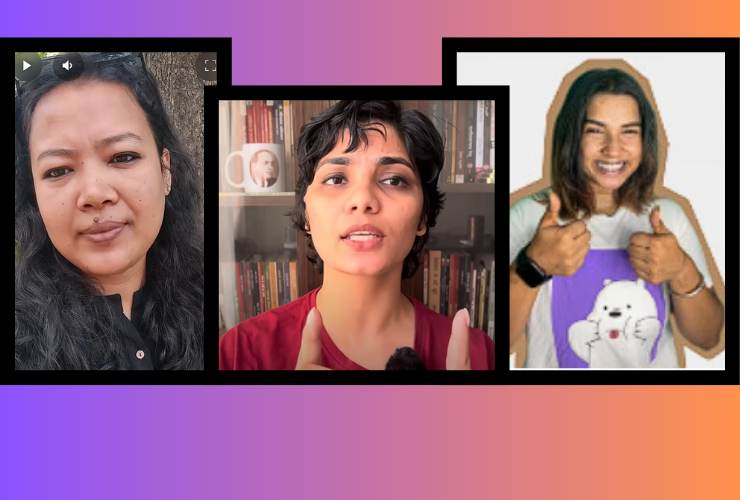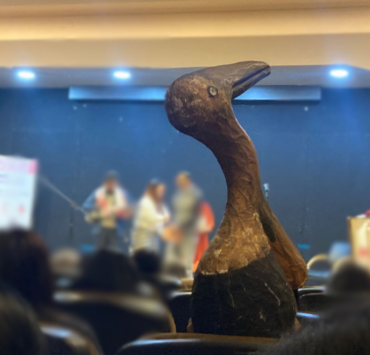

Update (May 7, 2025): A court in Uttar Pradesh on Tuesday (May 7) dismissed the criminal case filed against folk singer Neha Singh Rathore
The Network of Women in Media, India (NWMI) condemns the levelling of absurd and draconian charges of subversive activities against popular satirists and political commentators Neha Singh Rathore and Madri Kakoti (who goes by the name Dr Medusa) and the complaint filed against Shamita Yadav (who goes by the name The ranting gola), merely because they asked pertinent questions on the administrative and intelligence failures in the tragic Pahalgam attack of April 22, 2025.
The government backlash has not spared journalists. Sanjay Sharma, editor of the YouTube channel “4 PM News”, which had critiqued the government response to the Pahalgam attack, received an email from the service provider that his channel had been blocked by an order of the Union government since April 29, 2025, citing national security.
At least 25 tourists and one local pony ride operator, who were in the meadows of the Baisaran Valley, were killed and several others injured when four gunmen opened fire on them. While women and children were spared in the dastardly attack, male adults were targeted, allegedly after ascertaining the community they belonged to. Interviews with survivors revealed that the pony operator was killed when he attempted to wrestle with the gun of one of the attackers. According to reports, there were no security forces in the meadows.
In her video posted on the social media platform ‘X’, Rathore had raised several questions on the Pahalgam tragedy and asked what steps the government had taken to ensure the safety and security of citizens. The immensely popular Bhojpuri singer and satirist has been charged with acts endangering the sovereignty, integrity and unity of India (Sections 152, 196 (1) (a) and (b), 197 (1) (a) – (d), 353 (1) (c) and 353 (2) and 302 of the Bharatiya Nyaya Sanhita (BNS), 2023 and Sec 69 (a) of the Information Technology Act, 2008) in Hazratganj police station in Lucknow in Uttar Pradesh on the basis of a complaint filed by an activist of the Akhil Bharatiya Vidyarthi Parishad (ABVP), the student wing of the ruling Bharatiya Janata Party (BJP).
In a post on her ‘X’ account, Kakoti a.ka. Dr Medusa drew parallels between the targeting of tourists in Pahalgam after asking them their religion and incidents of lynching, denial of livelihood and accommodation, and the bulldozing of houses after asking people their religion. In her post, she said these were all terrorist incidents. Following this post, a case was lodged against Kakoti in Hasanganj police station on the basis of a complaint from Justin Shukla, an ABVP member and postgraduate student of Lucknow University. Kakoti has been charged with spreading enmity and enabling separatist activity under various sections of the BNS (Sections 197(1), 152, 302, 352, 353(2) and 196(1)(a) apart from provisions of the IT Act).
Section 152, which bears punishment up to life imprisonment, has been widely criticised for replacing sedition – Section 124 (a) of the Indian Penal Code – which has been kept in abeyance by the Supreme Court, without actually using the colonial-era term.
It is a matter of immense concern that Rathore and Kakoti have been charged with “inciting secession, armed rebellion, or subversive activities, as well as encouraging separatist feelings and destabilising the nation” simply because they exercised their democratic right to interrogate those in power.
A third complaint filed against Shamita Yadav a.k.a. The ranting gola, was filed by advocate Amita Sachdeva, who accused her of spreading “anti-Bharat propaganda,” insulting the Manusmriti, and amplifying content that was shared by a Pakistani social media account. The ranting gola, a popular political commentator, had posted a series of four videos between April 23-29, condemning the security lapses and seeking accountability from the Union government, in particular the Ministry of Home Affairs and the Union Defence Ministry.
It is pertinent to note that the questions raised by these satirists have also been voiced by numerous citizens, both in the media as well as on the streets. Even the survivors of this tragedy have spoken out about the lack of any kind of security and the manner in which local people rallied around to provide them with all assistance in their hour of grief.
These questions and the measured sentiments of survivors are in stark contrast to the ratcheting of hate and vitriolic war-mongering by right-wing elements, including sections of the mainstream and fringe media. Of particular concern are the disturbing reports of Kashmiri students being targeted in colleges and universities across the country and of the demonising of members of the Muslim community in small towns and cities.
The levying of serious charges of secession or separatism against political commentators is a chilling indicator of an inherently illiberal and authoritarian response to critical and dissenting opinions and ultimately strikes at the very foundations of a democracy.
NWMI believes that the media and citizens have a democratic right to ask questions of their government. In recent times, a number of social media commentators and influencers have effectively used satire to raise important social and political issues. In fact, it is clear from the BJP’s own moves that it recognises the importance of social media influencers. For instance, the Prime Minister has held one-on-one interactions with prominent pro-Right influencers and the government of Uttar Pradesh announced a social media policy to award social media influencers for their “positive” comments in 2024, thereby incentivising favourable analysis.
The Network of Women in Media, India
1 May 2025
Related:




